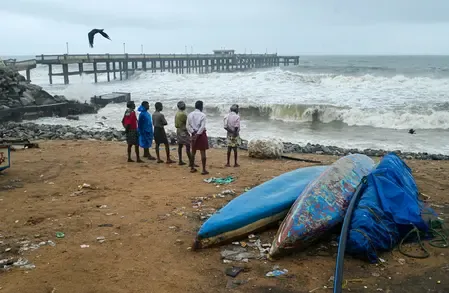Why Were Five TN Fishermen Arrested by the Sri Lankan Navy?

Synopsis
Key Takeaways
- Five Tamil fishermen arrested by the Sri Lankan Navy.
- Incident occurred near Katchatheevu.
- Fishermen's livelihoods are threatened.
- Call for diplomatic intervention from Tamil Nadu government.
- Ongoing tensions in Palk Strait pose challenges.
Chennai, July 29 (NationPress) Five Tamil fishermen hailing from Rameswaram were apprehended by the Sri Lankan Navy for reportedly breaching the International Maritime Boundary Line (IMBL) and engaging in fishing activities within Sri Lankan territorial waters near Neduntheevu (Katchatheevu) during the early hours of Tuesday.
As per information from local fishermen’s associations, the fishermen embarked on a journey into the sea on Monday night aboard a mechanized vessel and were fishing in the vicinity of Katchatheevu when they were stopped by a patrol from the Sri Lankan Navy.
The personnel of the Sri Lankan Navy took the five individuals into custody and confiscated their fishing boat.
It is anticipated that the detained fishermen will be transferred to either Kankesanthurai or Talaimannar, where they will be handed over to local authorities for subsequent legal actions.
This incident marks the latest occurrence in a series of apprehensions involving Tamil Nadu fishermen by the Sri Lankan Navy.
Earlier in mid-July, seven fishermen from Rameswaram faced similar circumstances, resulting in the confiscation of their boat. They were subsequently remanded into judicial custody in Vavuniya.
In February, a significant operation led to the detention of 32 fishermen and the seizure of five boats.
The ongoing arrests have raised alarms among the fishing community in Rameswaram, who express that their livelihoods are at stake.
“The sea is our only means of survival. Each arrest instills fear among others,” stated a representative of the fishermen’s union.
Fishermen’s associations have persistently urged the Indian and Tamil Nadu governments to engage with Sri Lanka regarding this issue and work towards a sustainable resolution. They have also demanded the return of confiscated boats, which signify considerable financial losses for the affected families.
Tamil Nadu Chief Minister M.K. Stalin has previously communicated with Union External Affairs Minister S. Jaishankar, requesting robust diplomatic measures to facilitate the release of arrested fishermen and to mitigate the occurrence of such incidents in the future.
As tensions remain high in the Palk Strait, this matter continues to be a significant challenge for the safety and livelihoods of Tamil Nadu’s coastal communities.










